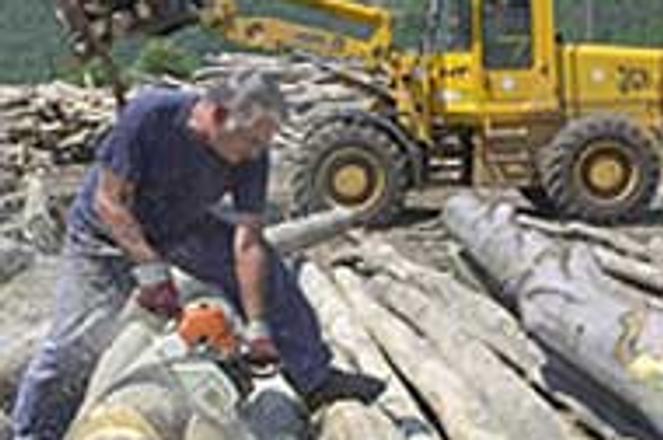Slovak forests are far from depleted, say pulp and paper experts.photo: TASR
Slovakia's booming pulp and paper industry is moving ahead of other domestic industrial sectors in the country. Impressive growth figures for the last few years underscore the important investments in the sector that have kept Slovak firms on a competitive footing with their western counterparts.
Figures released at the end of May by the Pulp and Paper Research Institute (VÚCP) have shown that 70% of the industry's expected 700,000 tons of pulp and paper production for this year will be exported, the main buyers being supermarket chains in the Czech Republic, Poland, Austria and Germany.
VÚCP director Štefan Bohačík said investment was also beckoning, with high-level talks underway with the US firm International Paper and Sweden's Stora Enso. Despite the possibility of a 20-30 billion crown infusion from potential investors to boost production capacities industry-wide, Bohačrek said, the recent talks with top-flight international firms had been made possible by the high quality of the industry's products.
"I think that in every [production] niche [of the industry], the quality of the paper is very competitive compared to, say, that in northern Scandinavian countries which are well-known for their paper products," he said. "Local factories here are using a lot of new technologies, with new paper machines. This high-tech approach is seen in the final paper products."
One of the biggest local producers of paper products in Slovakia is the Žilina-based Tento company. Tento's Ladislav Šebo said major investments in new machinery in the mid 1980s and one in 1994 were key factors in keeping his company competitive.
"In the last two years, the industry as a whole has been increasing, with Slovak firms on the cutting edge of technology. I don't know why the paper industry in particular has kept up with the west compared to other sectors of business, but there have been major investments in a number of other Slovak mills, such as in Ružomberok and Harmanec," he said
Šebo said that the machine purchased by Tento in 1994 had added 50,000 tons of capacity to its existing 20,000 tons. Profits followed, and Tento has experienced an 8.3% growth for the first quarter of 2000 over the same period from 1999. This figure represents a 30.8 million crown ($86,363) increase, to total a first-quarter turnover of 702.1 million crowns ($16 million). In 1999, the company's turnover was 2.51 billion crowns ($57 million), up from 2.25 billion in 1998, representing an 11.7% increase. At present, Tento employs 974 people.
Karol Balog, general director of the Agency for Industrial Development and Revitalisation, said that owning one of the largest wood resources in Europe was the key to Slovakia's success in the market.
"The amount of wood available is actually growing despite the logging that is being done, so we are growing more wood than is being harvested. This makes Slovakia a relatively large source for the wood or the pulp and paper industry," Balog said.
Bohaček said that an additional one million cubic metres of wood could be harvested per year while retaining a stable forest capacity. Approximately half of the raw materials used in the pulp and paper industry are from recycled products.
Despite the positive numbers, the pulp and paper industry is not immune to problems that plague Slovak business in general. Company management still lags behind the west in business strategy, and while many young people are moving up in the industry, they still lack the crucial business know-how.
"One problem is that there are not that many good businessmen in this industry here. During the communist era, we didn't need qualified business people; now we need them, but don't have them," Bohaček said.
"The lack of business knowledge is not only a problem in the pulp and paper industry but across the board. There is a lack of really qualified managers in any kind of industry in Slovakia," Balog agreed.
While the pulp and paper industry has been a success story, foreign investors are still seen as vital to keeping the industry competitive.
"The Slovak paper industry offers a lot of potential for investors from abroad working in this field. If an investor buys a Slovak mill, they will get very good technology for a reasonable price," Bohaček said.


